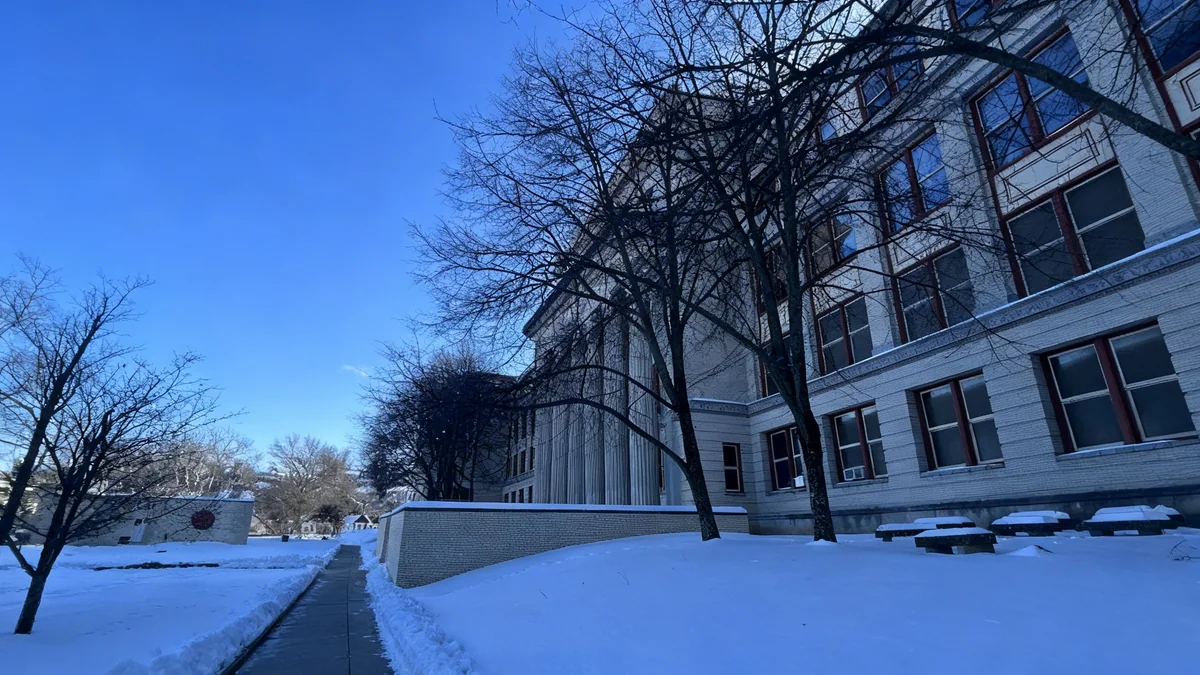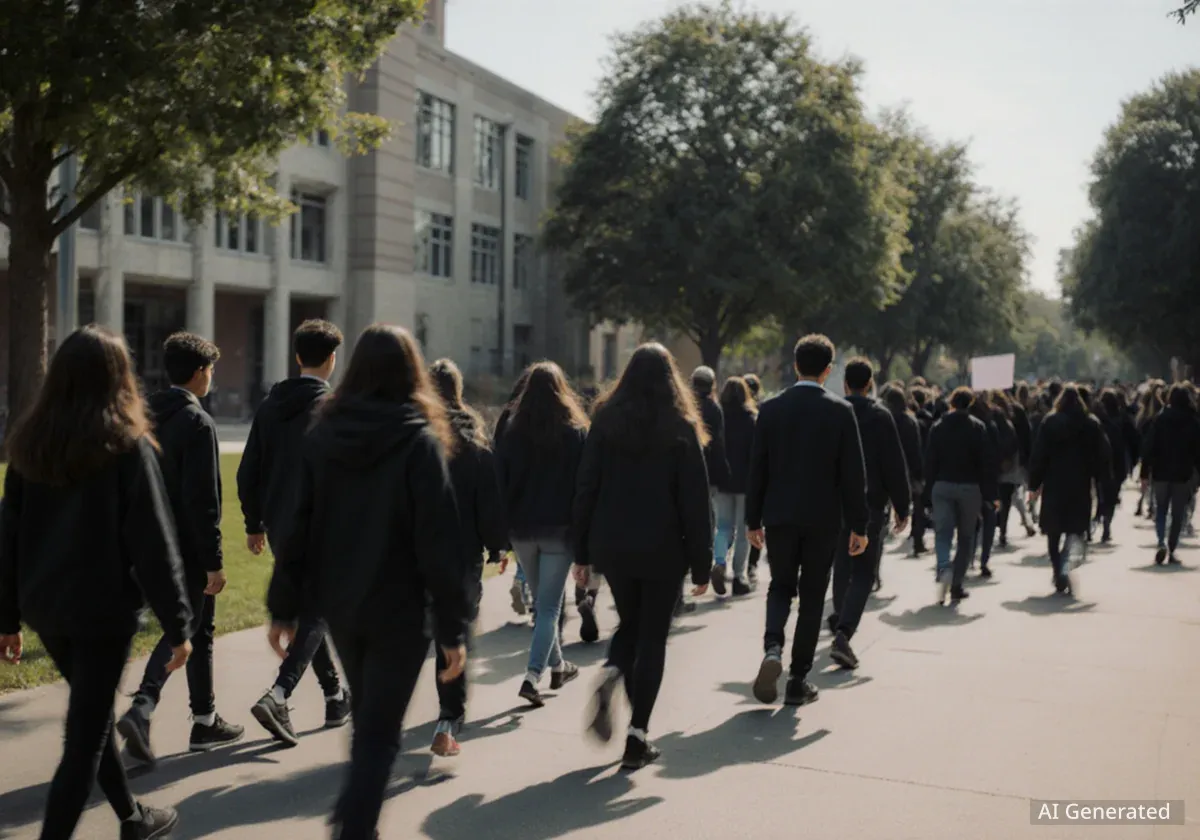Canadian immigration authorities are investigating approximately 47,000 international students for potentially failing to meet their visa requirements by not attending classes. The figure, which represents 8% of students reviewed, was disclosed by an official from Immigration, Refugees and Citizenship Canada (IRCC) during a parliamentary committee meeting.
While the number has raised concerns, officials and industry experts caution that these are preliminary findings. The process to confirm actual non-compliance is complex, and some believe the data indicates that Canada's fraud detection and oversight systems are becoming more effective.
Key Takeaways
- Approximately 47,175 international students in Canada have been flagged for potential non-compliance with study permit conditions.
- This figure represents 8% of the student population reviewed by immigration officials for attendance.
- The data is part of a broader effort by the Canadian government to enhance the integrity of its international student program.
- Experts suggest the numbers reflect a backlog of cases and improved fraud detection rather than a new crisis.
- Provinces are now required to use a stricter Provincial Attestation Letter (PAL) system to screen applicants before they arrive.
Government Identifies Potential Visa Violations
During a session with the House of Commons Standing Committee on Citizenship and Immigration, Aiesha Zafar, an assistant deputy minister at IRCC, provided details on the ongoing review. She stated that of the international students whose academic status was checked, 8% were flagged as "potentially non-compliant."
"In terms of the total number of students we asked for compliance information from, that results in potentially 47,175," Zafar told the committee. She emphasized that these are initial results and that a final determination has not yet been made for these cases.
The IRCC collaborates with the Canada Border Services Agency (CBSA) on these matters. The CBSA is responsible for investigating individuals who violate their visa conditions, which can lead to removal from the country.
The Complexity of Verifying Compliance
Zafar noted that confirming whether a student is genuinely non-compliant is a detailed process. Several factors can influence the data provided by educational institutions.
How Compliance is Monitored
Canada's compliance system, established in 2014, requires Designated Learning Institutions (DLIs) to submit reports on the enrollment status of their international students twice a year. Recent updates to the regulations allow the government to suspend non-reporting schools for up to one year, signaling a stricter approach to enforcement.
Legitimate reasons for a student to be flagged in the system include:
- Switching Institutions: Students may legally transfer to a different school after arriving in Canada.
- Authorized Leave: Some students may take an approved break from their studies for personal or medical reasons.
- Graduation: A student may have completed their program ahead of their study permit's expiration date.
- Reporting Lags: Educational institutions report attendance data at different times, which can create temporary discrepancies.
Industry Perspective on the Findings
Some education consultants argue that the 47,000 figure should be viewed as evidence of a system that is actively identifying and addressing long-standing issues, rather than one that is failing.
"The 47,000 non-compliance cases are a backlog, evidence that fraud detection is strengthening, not weakening, Canadian standards," stated Maria Mathai, founder of M.M Advisory Services.
Mathai explained that recent changes, particularly the introduction of Provincial Attestation Letters (PALs), have already made the screening process more robust. This new requirement acts as a front-end check, preventing many potentially non-genuine students from entering the country in the first place.
She added that provinces are now being forced to "adapt entry practices based on evidence and learning." This is particularly relevant for Ontario, which hosts the largest number of international students and previously saw a high concentration of PALs issued to colleges with higher rates of non-compliance.
A Persistent Challenge
The issue of non-compliant students is not new. Earlier this year, reports revealed that nearly 50,000 study permits were issued to individuals who never enrolled in a Canadian institution. The largest shares of these "no-shows" were from India, followed by China, Nigeria, and Ghana.
Institutions Enhance Screening Measures
In response to growing concerns, Canadian colleges and universities are implementing more rigorous application reviews. Pranav Rathi, an associate director at Fanshawe College, described a multi-layered verification process.
"Each application is carefully reviewed, and checked for aggregate scores, backlogs, and authenticity of mark sheets," Rathi said. He also confirmed that verifying English language proficiency through approved tests like IELTS is mandatory.
Rathi identified a key loophole that has contributed to the problem: the ability for students to change institutions after their study permit is approved. This flexibility has sometimes been exploited by individuals whose primary goal was not education.
"Institutions should ensure that their representatives are transparent, well-trained, and follow ethical recruitment practices that align with institutional and regulatory standards," he urged.
Political and Economic Context
The high volume of international students has become a significant political topic in Canada, with debates centering on its impact on housing, healthcare, and other public services. College administrators have been called to Parliament to address these concerns.
John Tibbits, president of Conestoga College, defended the role of educational institutions, telling lawmakers that they are committed to supporting local economies. He called for a more stable and sustainable international student program.
"Looking ahead, we believe this is the time to stabilize the system to build an international student program that is sustainable, fair, globally competitive and focused on Canada's economic priorities," Tibbits remarked.
Stricter Visa Policies in Effect
Canada has significantly tightened its visa approval process. Recent data indicates a record rejection rate for student visa applications, reaching as high as 62% in some periods, marking the country's toughest stance in a decade. Furthermore, study permit approvals in 2024 have fallen below government targets, a trend that appears to be continuing.
The government's investigation into the 47,000 potentially non-compliant students is a key part of this broader effort to restore integrity and sustainability to a program that is vital to Canada's economy and cultural diversity.





